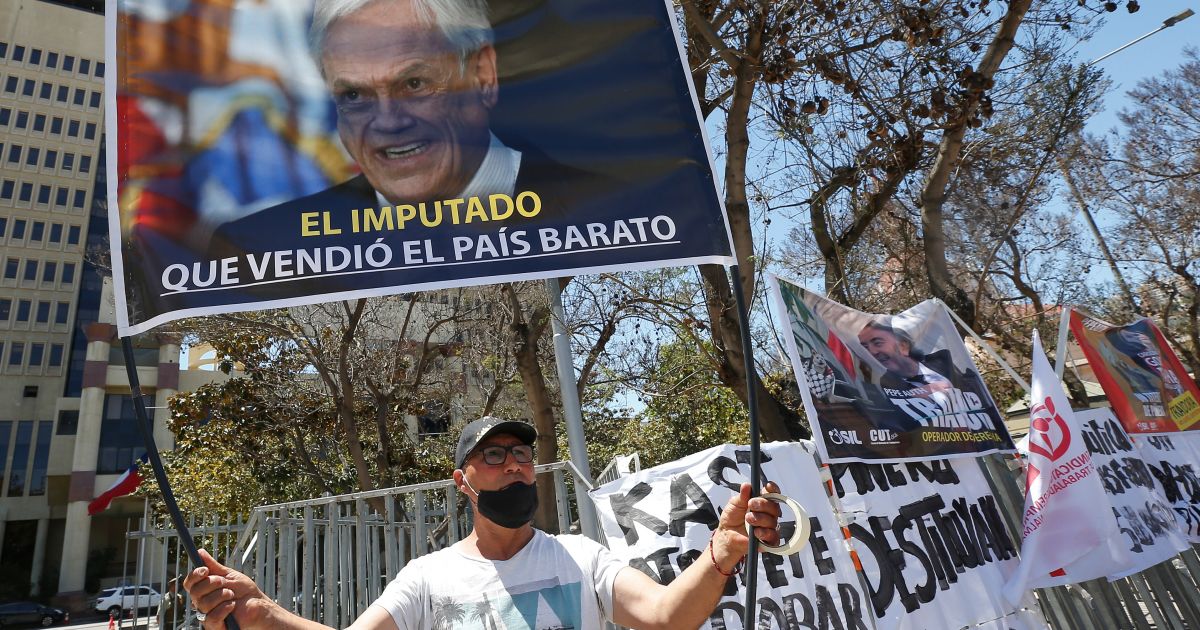
As Sebastian Pinera prepares to leave office, critics say he has failed to address rights abuses committed on his watch.
Talcahuano, Chile – In the final weeks of his presidency, Sebastian Pinera visited the port city of Talcahuano, Chile, last month to inaugurate the construction of a navy vessel. The site is sandwiched between the sea and green forest, in an expansive private area exclusive to the navy and their families.
It is a far cry from nearby Libertad, a vulnerable neighbourhood where Manuel Rebolledo Ibacache lives with his wife, Luisa Navarrete. Here, generations of families are packed into cramped homes built in the shadow of large, foul-smelling fishing warehouses.
When Pinera last visited this area in October 2021, the couple staged a protest in hopes of catching his attention, draping a banner with their son’s face and large letters spelling “justice” along the side of the street. Pinera’s car drove straight past them.
Their son, Manuel, was killed during a period of violent unrest in October 2019 after he was hit by a navy truck.
“We want justice. We want the man who killed our son to go to jail, and we want the president to go to jail,” Rebolledo Ibacache told Al Jazeera. “The president is leaving office with a clean slate, even though he’s 100 percent to blame.”
The 2019 protests, initially sparked by a rise in metro fares, quickly grew into a broader movement against inequality. Massive demonstrations were accompanied by episodes of arson, looting and violent clashes between armed forces and protesters. Pinera issued a state of emergency, sending out the military and declaring that the country was “at war with a powerful enemy”.
A billionaire conservative, Pinera was accused of human rights violations after his heavy-handed response left dozens dead and thousands injured, including hundreds who were hit in the eyes by shotgun pellets, blinding some of them. Today, families say they are still searching for justice.
The marine who struck and killed Manuel as he attempted to flee from the navy vehicle, Leonardo Medina Caamano, was convicted of a crime roughly equivalent to manslaughter, and received a 540-day sentence last year to be served outside of prison. Last week, the court rejected appeals by Manuel’s family to overturn the ruling and impose a more serious charge and prison sentence.
Manuel’s parents are now looking to take their son’s case to an international court, continuing their long quest for accountability. Navarrete believes her son would not have died, were it not for Pinera’s emergency declaration.
“A president can’t declare war on his own people,” she told Al Jazeera.
‘Aware of the risks’
Natalia Perez knows this anger all too well, having spent more than two years seeking justice for her former partner, Alex Nunez, who died after three police officers chased him as he walked home in Santiago in October 2019, and then beat him badly. He later died in hospital.
Perez told Al Jazeera that she still does not know the names of the officers responsible, saying police appear to have “made a pact of silence”. She also holds Pinera responsible for the actions of Chilean security forces, and for their ongoing impunity. “I hope one day, Pinera is stripped of everything,” she said.
The national police chief at the time of Nunez’s death has previously said there was “little information” available on the case, noting that any officers found guilty should receive “maximum sanctions”. A spokesperson for Chile’s national police force told Al Jazeera that they could not comment on a pending investigation.
Pinera has previously said that any members of the country’s military or police forces found guilty of rights violations would be punished. In a recent interview with a Chilean newspaper, he said he was “aware of the risks” of prosecution in international courts for human rights violations committed during the 2019 protests, but stressed his “full conviction that the accusations are not substantiated”.
The government media relations office declined to provide Al Jazeera with any further comment on the matter.
Human rights lawyer Cristian Cruz conceded that it would be “very difficult” to prosecute Pinera in an international court.
“Pinera managed to get one of his own ministers elected as a judge in the international Inter-American Court [of Human Rights],” he told Al Jazeera, referring to the recent election of Patricia Perez Goldberg, who served as justice minister in Pinera’s first government. “He’s covered his tracks very well.”
Some families are holding out hope that Gabriel Boric, Chile’s left-wing president-elect who assumes office on Friday, will support them, as he has expressed solidarity with those affected by the 2019 repression. According to Cruz, “justice depends on cleaning up the police” – and he will keep pushing in that direction as long as his client, Perez, wishes to continue.
“I dream of the moment that I can say, ‘Ale, rest in peace because justice has come,’” Perez said through tears. “That is my hope.”








